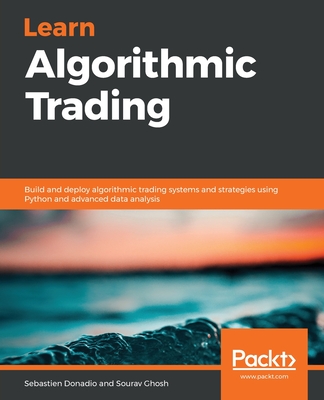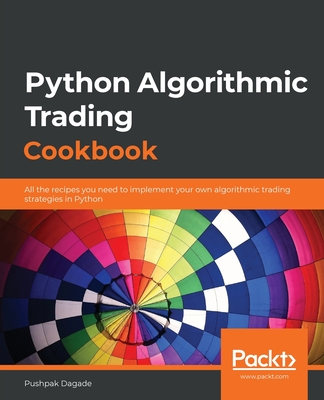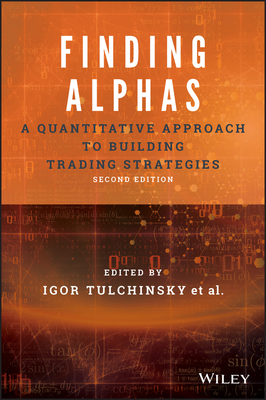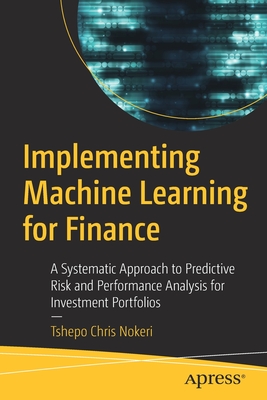Machine Learning for Algorithmic Trading, 2/e (Paperback)
暫譯: 算法交易的機器學習,第二版 (平裝本)
Stefan Jansen
- 出版商: Packt Publishing
- 出版日期: 2020-07-31
- 售價: $2,300
- 貴賓價: 9.5 折 $2,185
- 語言: 英文
- 頁數: 820
- 裝訂: Quality Paper - also called trade paper
- ISBN: 1839217715
- ISBN-13: 9781839217715
-
相關分類:
Machine Learning、Algorithms-data-structures
-
相關翻譯:
機器學習在算法交易中的應用, 2/e (簡中版)
立即出貨 (庫存=1)
買這商品的人也買了...
-
 大話設計模式
大話設計模式$620$527 -
 無瑕的程式碼-敏捷軟體開發技巧守則 (Clean Code: A Handbook of Agile Software Craftsmanship)
無瑕的程式碼-敏捷軟體開發技巧守則 (Clean Code: A Handbook of Agile Software Craftsmanship)$580$452 -
.jpg) 走進我的交易室:股市贏家交易全攻略練習本 (Study Guide for Come Into My Trading Room:A Complete Guide to Trading)
走進我的交易室:股市贏家交易全攻略練習本 (Study Guide for Come Into My Trading Room:A Complete Guide to Trading)$280$238 -
 Algorithmic and High-Frequency Trading
Algorithmic and High-Frequency Trading$3,150$2,993 -
 $352Python 貝葉斯分析
$352Python 貝葉斯分析 -
 Advances in Financial Machine Learning (Hardcover)
Advances in Financial Machine Learning (Hardcover)$1,948$1,845 -
 Learn JavaScript with p5.js: Coding for Visual Learners
Learn JavaScript with p5.js: Coding for Visual Learners$1,300$1,235 -
 $1,710Learn Algorithmic Trading
$1,710Learn Algorithmic Trading -
 $1,788Deep Reinforcement Learning Hands-On, 2/e (Paperback)
$1,788Deep Reinforcement Learning Hands-On, 2/e (Paperback) -
 Python Algorithmic Trading Cookbook: All the recipes you need to implement your own algorithmic trading strategies in Python
Python Algorithmic Trading Cookbook: All the recipes you need to implement your own algorithmic trading strategies in Python$1,700$1,615 -
 $2,754Artificial Intelligence in Finance: A Python-Based Guide
$2,754Artificial Intelligence in Finance: A Python-Based Guide -
 $1,962Reinforcement Learning: Industrial Applications of Intelligent Agents
$1,962Reinforcement Learning: Industrial Applications of Intelligent Agents -
 Finding Alphas: A Quantitative Approach to Building Trading Strategies
Finding Alphas: A Quantitative Approach to Building Trading Strategies$1,840$1,748 -
 金融怪傑.達文熙教你用 100張圖學會箱子戰法:傳承60年經典理論,融合台股贏家思維,散戶一學就會的交易 SOP大公開
金融怪傑.達文熙教你用 100張圖學會箱子戰法:傳承60年經典理論,融合台股贏家思維,散戶一學就會的交易 SOP大公開$350$298 -
 Stocks and Forex Trading: How to Win
Stocks and Forex Trading: How to Win$1,400$1,330 -
 Algorithmic Short Selling with Python: Refine your algorithmic trading edge, consistently generate investment ideas, and build a robust long/short pro (Paperback)
Algorithmic Short Selling with Python: Refine your algorithmic trading edge, consistently generate investment ideas, and build a robust long/short pro (Paperback)$2,200$2,090 -
 金融機器學習與資料科學藍圖 (Machine Learning and Data Science Blueprints for Finance: From Building Trading Strategies to Robo-Advisors Using Python)
金融機器學習與資料科學藍圖 (Machine Learning and Data Science Blueprints for Finance: From Building Trading Strategies to Robo-Advisors Using Python)$780$616 -
 $2,446Mastering Financial Pattern Recognition: Finding and Back-Testing Candlestick Patterns with Python
$2,446Mastering Financial Pattern Recognition: Finding and Back-Testing Candlestick Patterns with Python -
 $2,024Training Data for Machine Learning: Human Supervision from Annotation to Data Science
$2,024Training Data for Machine Learning: Human Supervision from Annotation to Data Science -
 內網滲透實戰攻略
內網滲透實戰攻略$594$564 -
 Power BI x Copilot x ChatGPT 商業報表設計入門:資料清理、資料模型、資料視覺化到報表共享建立全局觀念
Power BI x Copilot x ChatGPT 商業報表設計入門:資料清理、資料模型、資料視覺化到報表共享建立全局觀念$630$497 -
 Deep Learning for Finance: Creating Machine & Deep Learning Models for Trading in Python
Deep Learning for Finance: Creating Machine & Deep Learning Models for Trading in Python$2,328$2,205 -
 AI 神助攻!程式設計新境界 – GitHub Copilot 開發 Python 如虎添翼 : 提示工程、問題分解、測試案例、除錯
AI 神助攻!程式設計新境界 – GitHub Copilot 開發 Python 如虎添翼 : 提示工程、問題分解、測試案例、除錯$560$442 -
 生成式 AI:以 ChatGPT 與 OpenAI 模型實現高效創新 (Modern Generative AI with ChatGPT and OpenAI Models)
生成式 AI:以 ChatGPT 與 OpenAI 模型實現高效創新 (Modern Generative AI with ChatGPT and OpenAI Models)$500$395 -
 資料科學:困難部分 (Data Science: The Hard Parts: Techniques for Excelling at Data Science)
資料科學:困難部分 (Data Science: The Hard Parts: Techniques for Excelling at Data Science)$680$537
商品描述
Leverage machine learning to design and back-test automated trading strategies for real-world markets using pandas, TA-Lib, scikit-learn, LightGBM, SpaCy, Gensim, TensorFlow 2, Zipline, backtrader, Alphalens, and pyfolio.
Key Features
- Design, train, and evaluate machine learning algorithms that underpin automated trading strategies
- Create a research and strategy development process to apply predictive modeling to trading decisions
- Leverage NLP and deep learning to extract tradeable signals from market and alternative data
Book Description
The explosive growth of digital data has boosted the demand for expertise in trading strategies that use machine learning (ML). This revised and expanded second edition enables you to build and evaluate sophisticated supervised, unsupervised, and reinforcement learning models.
This book introduces end-to-end machine learning for the trading workflow, from the idea and feature engineering to model optimization, strategy design, and backtesting. It illustrates this by using examples ranging from linear models and tree-based ensembles to deep-learning techniques from cutting edge research.
This edition shows how to work with market, fundamental, and alternative data, such as tick data, minute and daily bars, SEC filings, earnings call transcripts, financial news, or satellite images to generate tradeable signals. It illustrates how to engineer financial features or alpha factors that enable an ML model to predict returns from price data for US and international stocks and ETFs. It also shows how to assess the signal content of new features using Alphalens and SHAP values and includes a new appendix with over one hundred alpha factor examples.
By the end, you will be proficient in translating ML model predictions into a trading strategy that operates at daily or intraday horizons, and in evaluating its performance.
What you will learn
- Leverage market, fundamental, and alternative text and image data
- Research and evaluate alpha factors using statistics, Alphalens, and SHAP values
- Implement machine learning techniques to solve investment and trading problems
- Backtest and evaluate trading strategies based on machine learning using Zipline and Backtrader
- Optimize portfolio risk and performance analysis using pandas, NumPy, and pyfolio
- Create a pairs trading strategy based on cointegration for US equities and ETFs
- Train a gradient boosting model to predict intraday returns using AlgoSeek's high-quality trades and quotes data
Who this book is for
If you are a data analyst, data scientist, Python developer, investment analyst, or portfolio manager interested in getting hands-on machine learning knowledge for trading, this book is for you. This book is for you if you want to learn how to extract value from a diverse set of data sources using machine learning to design your own systematic trading strategies.
Some understanding of Python and machine learning techniques is required.
商品描述(中文翻譯)
**利用機器學習設計和回測自動化交易策略,應用於真實市場,使用 pandas、TA-Lib、scikit-learn、LightGBM、SpaCy、Gensim、TensorFlow 2、Zipline、backtrader、Alphalens 和 pyfolio。**
#### 主要特點
- 設計、訓練和評估支撐自動化交易策略的機器學習算法
- 創建研究和策略開發過程,將預測建模應用於交易決策
- 利用自然語言處理 (NLP) 和深度學習從市場和替代數據中提取可交易信號
#### 書籍描述
數位數據的爆炸性增長提升了對使用機器學習 (ML) 的交易策略專業知識的需求。本修訂和擴展的第二版使您能夠構建和評估複雜的監督式、非監督式和強化學習模型。
本書介紹了交易工作流程的端到端機器學習,從想法和特徵工程到模型優化、策略設計和回測。它通過使用從線性模型和基於樹的集成到前沿研究的深度學習技術的範例來說明這一點。
本版展示了如何處理市場、基本面和替代數據,例如逐筆數據、分鐘和日線、SEC 申報、財報電話會議記錄、金融新聞或衛星圖像,以生成可交易信號。它說明了如何工程化金融特徵或阿爾法因子,使機器學習模型能夠從美國和國際股票及 ETF 的價格數據中預測回報。它還展示了如何使用 Alphalens 和 SHAP 值評估新特徵的信號內容,並包含一個新的附錄,提供超過一百個阿爾法因子的範例。
到最後,您將能夠熟練地將機器學習模型的預測轉化為在日內或日常時間範圍內運作的交易策略,並評估其表現。
#### 您將學到的內容
- 利用市場、基本面和替代文本及圖像數據
- 使用統計、Alphalens 和 SHAP 值研究和評估阿爾法因子
- 實施機器學習技術以解決投資和交易問題
- 使用 Zipline 和 Backtrader 回測和評估基於機器學習的交易策略
- 使用 pandas、NumPy 和 pyfolio 優化投資組合風險和表現分析
- 基於共整合創建美國股票和 ETF 的配對交易策略
- 使用 AlgoSeek 的高品質交易和報價數據訓練梯度提升模型以預測日內回報
#### 本書適合誰
如果您是數據分析師、數據科學家、Python 開發者、投資分析師或投資組合經理,並對獲得實用的機器學習交易知識感興趣,那麼這本書適合您。如果您想學習如何利用機器學習從多樣的數據來源中提取價值,以設計自己的系統化交易策略,這本書也適合您。
需要對 Python 和機器學習技術有一定的理解。
作者簡介
Stefan is the founder and CEO of Applied AI. He advises Fortune 500 companies, investment firms, and startups across industries on data & AI strategy, building data science teams, and developing end-to-end machine learning solutions for a broad range of business problems.
Before his current venture, he was a partner and managing director at an international investment firm, where he built the predictive analytics and investment research practice. He was also a senior executive at a global fintech company with operations in 15 markets, advised Central Banks in emerging markets, and consulted for the World Bank.
He holds Master's degrees in Computer Science from Georgia Tech and in Economics from Harvard and Free University Berlin, and a CFA Charter. He has worked in six languages across Europe, Asia, and the Americas and taught data science at Datacamp and General Assembly.
作者簡介(中文翻譯)
Stefan 是 Applied AI 的創辦人兼執行長。他為《財富》500 強公司、投資公司和各行各業的初創企業提供有關數據與人工智慧策略的建議,協助建立數據科學團隊,並開發針對各種商業問題的端到端機器學習解決方案。
在創辦目前的公司之前,他曾是一家國際投資公司的合夥人和董事總經理,負責建立預測分析和投資研究實務。他還曾擔任一家在 15 個市場運營的全球金融科技公司的高級主管,為新興市場的中央銀行提供建議,並為世界銀行提供諮詢服務。
他擁有喬治亞理工學院的計算機科學碩士學位、哈佛大學和柏林自由大學的經濟學碩士學位,以及 CFA 特許資格。他曾在歐洲、亞洲和美洲六種語言的環境中工作,並在 Datacamp 和 General Assembly 教授數據科學。
目錄大綱
(N.B. Please use the Look Inside option to see further chapters)
- Machine Learning for Trading – From Idea to Execution
- Market and Fundamental Data – Sources and Techniques
- Alternative Data for Finance – Categories and Use Cases
- Financial Feature Engineering – How to Research Alpha Factors
- Portfolio Optimization and Performance Evaluation
- The Machine Learning Process
- Linear Models – From Risk Factors to Return Forecasts
- The ML4T Workflow – From Model to Strategy Backtesting
- Time-Series Models for Volatility Forecasts and Statistical Arbitrage
- Bayesian ML – Dynamic Sharpe Ratios and Pairs Trading
目錄大綱(中文翻譯)
(N.B. Please use the Look Inside option to see further chapters)
- Machine Learning for Trading – From Idea to Execution
- Market and Fundamental Data – Sources and Techniques
- Alternative Data for Finance – Categories and Use Cases
- Financial Feature Engineering – How to Research Alpha Factors
- Portfolio Optimization and Performance Evaluation
- The Machine Learning Process
- Linear Models – From Risk Factors to Return Forecasts
- The ML4T Workflow – From Model to Strategy Backtesting
- Time-Series Models for Volatility Forecasts and Statistical Arbitrage
- Bayesian ML – Dynamic Sharpe Ratios and Pairs Trading













